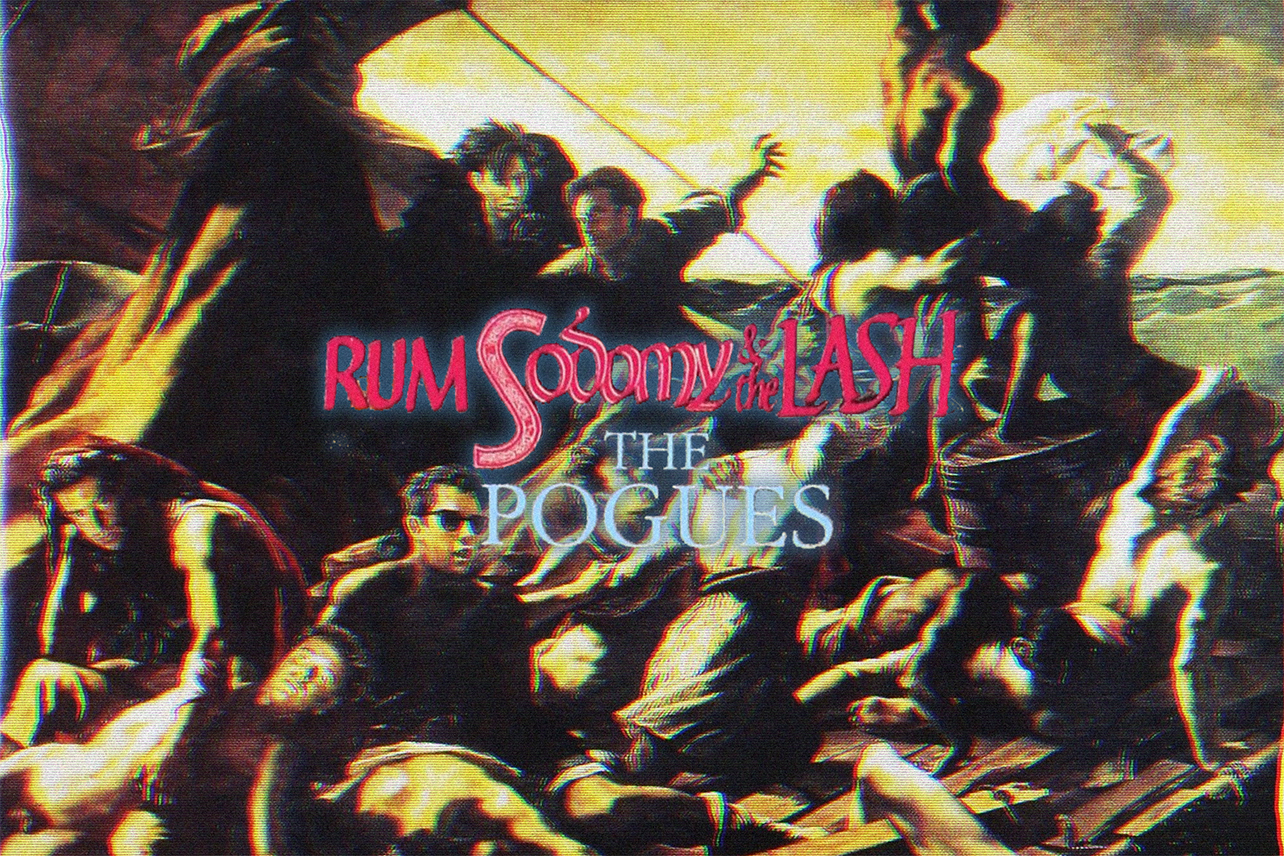The Pogues' 1984 debut Red Roses for Me was a proof of concept, and a terrific one. Already, the songs are there — "Transmetropolitan," "Sea Shanty," "Dark Streets of London" — and the innovative mixture of traditional Celtic folk with the transgressive lyrical themes and aggressive rhythms of punk rock is fully on display. It's truly impressive how much the band fully engulfs themselves in this new sound right from the get-go. At the same time, it is a debut, and there was a lot of room for improvement. Their version of the "The Auld Triangle" meanders, and throughout the production from Stan Brennan — a friend of Shane MacGowan who'd managed his previous band The Nips — is scrappy and claustrophobic, fitting the punk side of The Pogues' sound more than the folk side.
Less than a year later, in August 1985, the band's second album was released, produced by Elvis Costello, titled Rum Sodomy and the Lash. It is The Pogues' magnum opus, one of the greatest albums ever made, and it reveals its massive improvements on Red Roses for Me right from track one, "The Sick Bed of Cúchulainn," an original song that has the timelessness of any old Irish folk song.
There is a clear separation on the debut between the MacGowan originals like "Transmetropolitan" and traditional folk songs like "Poor Paddy." But on their sophomore album, MacGowan's writing has quickly sharpened enough to remove that dichotomy. The only way to really know which songs are his is by paying close attention to the lyrics, noting which ones have lines like "Sick Bed's" "When you pissed yourself in Frankfurt and got syph down in Cologne/And you heard the rattling death trains as you lay there all alone/Frank Ryan bought you whiskey in a brothel in Madrid/And you decked some fucking black shirt who was cursing all the Yids." Track two, "The Old Main Drag," takes this even further.
"The Old Main Drag" is The Pogues' first masterpiece, a painful tale of prostitution and destitution, told with a sonic minimalism (driven by a mournful accordion) absent from the continuously jaunty tracklist of Red Roses for Me. The dropping of the word "shemales" hits my 21st century transsexual ears wrong, sure, the same way the dropping of "faggot" on the following album's "Fairytale of New York" does. But it doesn't get in the way of "The Old Main Drag's" unblinking honesty about the desperate situations queer people are often forced into. The protagonist MacGowan sings as is a young man arriving in London with big dreams and little money, who quickly ends up a junkie hustler in the red light district, with his looks all he has. Then he's arrested, horribly beaten, and has even that one asset taken away, before being tossed back onto the street, an addict with nothing: "I know that I am dying and I wish I could beg/For some money to take me from the old main drag."
The brutality of the text doesn't get in the way of the song's permanence. When "The Old Main Drag" scored the final scene Gus Van Sant's brilliant My Own Private Idaho, a film that combines the story of two gay hustlers with a loose adaptation of Shakespeare, the natural blending of the traditional and the modern seems to be the point, even more than the ways the lyrics reflect the film's story.
After this, the exhilarating instrumental "The Wild Cats of Kilkenny" is the third in a string of incredible originals. But the rest of the album only contains three more MacGowan originals: the singles "A Pair of Brown Eyes" and "Sally MacLennane" and the upbeat singalong "Billy's Bones." There's also "Navigator," written by Phil Gaston, an Irish songwriter who managed The Nips along with Brennan. And the rest of the album is covers and arrangements of traditional folk songs. But even here, there's massive improvement, both the band's increasing tightness and Costello's production creating definitive takes on much-performed songs like "Dirty Old Town" and "Jesse James," as well as a hilarious version of "The Gentleman Soldier."
But there are two arrangements that stand high above the rest, the two best tracks on the album. First is "I'm a Man You Don't Meet Everyday," a particularly delicate recording for The Pogues, and the only song in their discography to feature bassist Cait O'Riordan on lead vocals. She left the band the following year and their failure to give her voice more than a single feature before her tenure ended was a gigantic mistake. No hyperbole, O'Riordan gives my favorite vocal performance in popular music history on "I'm a Man You Don't Meet Everyday." It's simultaneously modest — shy, even — and otherworldly. Her voice captures the melancholy of Celtic folk music beautifully, so moving that they have to take a break for a solo. (That solo, played on uilleann pipes by Tommy Keane, is absolutely stunning as well.)
Then there's "And the Band Played Waltzing Matilda," the eight-minute closing track. Written by songwriter Eric Bogle in 1971, it's maybe the most effective anti-war song I've ever heard (the only possible competition being Bill Withers' "I Can't Write Left-Handed"). What it captures is the meaninglessness that fighting for one's country carries with it, how little glory there really is once the battles are fought and your legs are gone.
"And the old men march slowly, old bones stiff and sore/They're tired old heroes from a forgotten war/And the young people ask, 'What are they marching for?'/And I ask myself the same question"
MacGowan's delivery on the song is tired, defeated, hardly able to muster the energy to care enough to feel betrayed. So the two best tracks on Rum Sodomy & the Lash show two vocalists whose commitment to selling a palpable aching creates something wholly unique out of old standards. Into the future, Celtic punk would often try to go further, more exaggerated in its exploration of the extremes of punk and folk music. But here, The Pogues' brilliance was in wondering if the two genres were even that different to begin with. By performing "The Old Main Drag" and "I'm a Man You Don't Meet Everyday" with equal weight and respect, the former sounds traditional and the latter sounds modern. The fusion of the past and the present created something that, 40 years on, sounds as if it exists outside the bounds of time altogether.
If you haven't already, consider supporting worker-owned media by subscribing to Pop Heist. We are ad-free and operating outside the algorithm, so all dollars go directly to paying the staff members and writers who make articles like this one possible.






